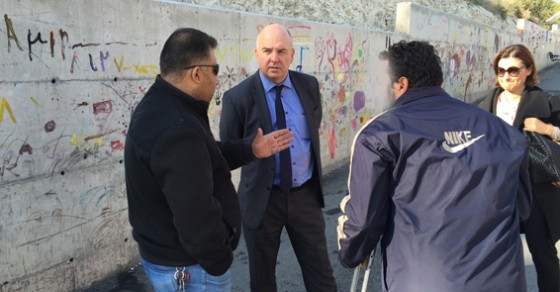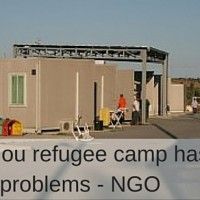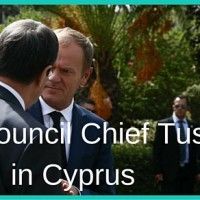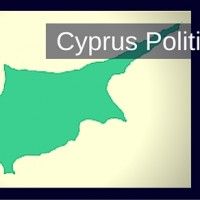
Refugees Languish Two Decades at Menoyia Camp
Severe abuse of power against vulnerable people with nothing to their name but their non-negotiable human rights.
Even Kafka - who had the patience to write his detailed novel The Trial about the cruel prosecution of an individual by a remote authority - would have had a heart attack at the bureaucratic incompetence of the authorities handling refugees at the Menoyia camp, some of which have been languishing there for literally two decades. There are families whose children graduated from Cypriot schools and yet still have no documents to give them a secure future, or at least a measure of formal recognition that they exist as human beings with rights.
According to information from anti-racist NGO KISA, the migrants have protested once more against the acting director of the civil registration and migration department. The lack of communication and action on their cases is truly unbelievable, and many of the migrants are detained illegally, says the NGO.
“In the detention centre in Menoyia are held asylum seekers, one recognized refugee, persons who are family members of Cypriot or European citizens and individuals who have been detained long term (beyond six months) without the possibility of deportation,” says the organisation.
“We had a conversation with detainees who have been in Cyprus for more than 20 years, having arrived as children with their families and graduating from Cypriot schools, and they are at this point classified as undocumented migrants in the country and they have been detained on the basis of being “unwanted migrants” as the state has failed or does not want to provide decisive solutions to their issues. Additionally, it has been found that many people who have been held in detention have serious health problems that have either been caused or / and aggravated by the detention conditions and the problematic accessibility to the health system. Lastly, some of the detainees have reported the use of violence against them by certain officers of the Centre.”
There are also serious problems at the reception centre for asylum seekers in Kofinou as well as at the Pournara Reception Centre in Kokkinotrimithia, says KISA.
The organisation comments: “Since last August, KISA has reported, through a letter to the Interior Minister, the participation of a person in the management of the centre who has previously been involved in incidents of violence against an underage refugee and against a volunteer at the centre. Unfortunately, instead of his removal from the position and the imposition of an exemplary punishment, this person remains at the centre, while KISA’s complaint against his illegal actions and behavior, has led to a vengeful and illegal obstruction to KISA’s access to the centre and the refugees. At the moment, these issues are before the Attorney General and the Chief of the Police who, as we hope, will address the issue.”
KISA’s concerns are echoed by authorities in the EU.
“I remain seriously concerned about the grave shortcomings of the national asylum system. The authorities need to redouble their efforts to improve reception conditions and fully align domestic asylum procedures with European human rights standards” said Nils Muižnieks, the Council of Europe Commissioner for Human Rights after a five-day visit to Cyprus.
“I am also concerned by the lack of legal assistance for asylum seekers and the often excessive length of the asylum procedure” added Commissioner Muižnieks. “Most of the asylum seekers are granted subsidiary protection, which excludes them from enjoying their right to family reunification. The very few who are granted refugee status also face difficulties because of the lack of integration policies and the very long and complicated naturalisation procedures,” he adds.
This state of affairs hasn’t just arisen from recent years, it is an institutionalised problem of bureaucratic barriers and inefficiency that translate into severe abuse of power against vulnerable people with nothing to their name but their non-negotiable human rights.
The authorities in Cyprus should be the first to respect these rights given the situation with Turkey’s occupation. After all, if the state doesn’t have the moral high ground with respect to human rights, how can it expect fair treatment for its own complaints on the basis of human rights and international law?
[easy-pricing-table id=”217″] About Sarah Fenwick
Editor, journalist, jazz singer and digital marketing consultant.
More from CyprusNewsReport.com
Bookmark worthy
- Non Gamstop Casino
- Casino Not On Gamstop
- Non Gamstop Casinos
- Casino Italiani Non Aams
- Slot Sites Not On Gamstop
- Best Non Gamstop Casinos UK 2025
- Crypto Casino
- Online Casinos UK
- Betting Sites Not On Gamstop UK
- UK Casino Not On Gamstop
- Best Non Gamstop Casinos
- Sites Not On Gamstop
- Online Betting Sites Not On Gamstop
- Non Gamstop Casino
- UK Casinos Not On Gamstop
- Non Gamstop Casino
- Casino Sites Not On Gamstop
- Casino Non Aams
- Casinos Sin Licencia España
- Casino Sites UK
- Slots Not On Gamstop
- Best Slot Sites For Winning UK
- Casino En Ligne
- Slots Not On Gamstop
- Non Gamstop Casino Sites UK
- Casino Non Aams
- Non Gamstop Casinos
- Meilleur Casino En Ligne France
- Meilleurs Sites De Paris Sportifs Belgique
- Nouveau Casino En Ligne Belgie
- Nouveau Casino En Ligne Francais
- Paris Sportif Ufc France
- Casino En Ligne Retrait Immediat
- Migliori Casino Online
- Site Casino En Ligne
- Nouveau Casino En Ligne Francais
- Casino En Ligne Francais
- Casino En Ligne
- Best Online Casino Sites In Malaysia
- Avis Tortuga Casino












Leave a reply
You must be logged in to post a comment.